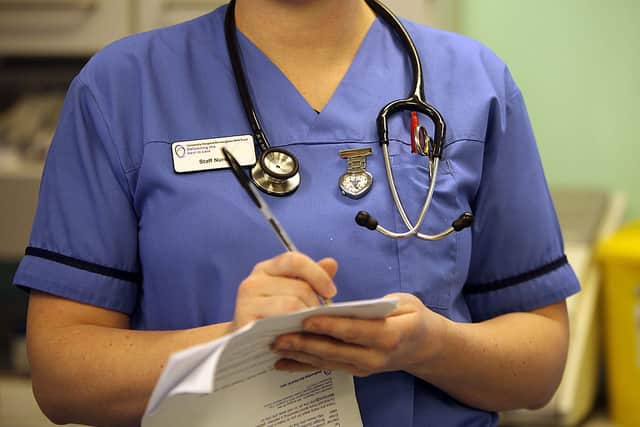What is stiff person syndrome? Condition explained as Celine Dion cancels remaining Courage World Tour dates
and live on Freeview channel 276
Celine Dion has cancelled the remainder of her Courage World Tour dates currently on sale for 2023. The news comes after the singer shared the news of her stiff person syndrome (SPS) diagnosis on Instagram in December last year.
In a statement shared with fans, Dion said: "I'm so sorry to disappoint all of you once again. I'm working really hard to build back my strength, but touring can be very difficult even when you're 100%. It's not fair to you to keep postponing shows, and even though it breaks my heart, it's best that we cancel everything now until I'm really ready to be back on stage again. I want you all to know, I'm not giving up... and I can't wait to see you again!"
This is everything you need to know.
What is stiff person syndrome - what are the symptoms?
Advertisement
Hide AdAdvertisement
Hide AdStiff person syndrome (SPS) is a rare and progressive neurological disorder. The National Institute of Neurological Disorders and Stroke (NINDS) says that “scientists don’t yet understand what causes SPS, but research indicates that it is the result of an autoimmune response gone awry in the brain and spinal cord”.
Symptoms of SPS include:
- Stiff muscles in the torso, arms and legs
- Muscle spasms
- Greater sensitivity to noise and touch
- Emotional distress
- Chronic pain


In some cases, SPS can result in a person needing to use the aid of a cane or wheelchair, and muscle spasms can be so severe that they can dislocate joints and even break bones. Most people with SPS will start experiencing symptoms between the ages of 30 and 60.
According to the Stiff Person Syndrome Research Foundation, SPS takes “on average seven years to identify” and is often mistaken for other conditions, like Multiple Sclerosis, Parkinson’s, Fibromyalgia, Psychosomatic Illness, anxiety, phobia and other autoimmune diseases.
Can it be treated?
Currently, there is no cure for SPS, however there are medications that can help relieve the individual symptoms associated with the disorder, like sedatives, muscle relaxants and steroids.
Advertisement
Hide AdAdvertisement
Hide AdNINDS says that a study funded by the National Institute “showed that intravenous immunoglobulin (IVIg) treatment is effective in reducing stiffness, sensitivity to noise, touch, and stress and for improving gait and balance for people with SPS”. It adds: “IVIg contains immunoglobulins (natural antibodies produced by the immune system) derived from thousands of healthy donors”.
Non-medication approaches are also available as well, like heat therapy, aqua therapy, massage therapy and acupuncture.
When did Celine Dion share her SPS diagnosis?
In December last year, the Canadian singer revealed on Instagram that she had cancelled and rescheduled dates for her European tour, which had been set to start in February this year, due to being diagnosed with the rare neurological condition. She said that the spasms caused by SPS affected her “daily life”, as well as creating issues for her mobility and vocal cords.
Dion wrote at the time: “I’ve been dealing with problems with my health for a long time, and it’s been really difficult for me to face these challenges and to talk about everything that I’ve been going through…
Advertisement
Hide AdAdvertisement
Hide Ad“It hurts me to tell you that I won’t be ready to restart my tour in Europe in February.”


She continued in an Instagram video: “Hello everyone, I’m sorry it’s taken me so long to reach out to you, I miss you all so much and I can’t wait to be on stage talking to you in person. As you know, I’ve always been an open book and I wasn’t ready to say anything before but I’m ready now. I’ve been dealing with problems with my health for a long time and it’s been really difficult for me to face these challenges and to talk about everything that I’ve been going through.
“Recently I’ve been diagnosed with a very rare neurological disorder called the stiff person syndrome which affects something like one in a million people. While we’re still learning about this rare condition, we now know this is what’s been causing all of the spasms that I’ve been having. Unfortunately, these spasms affect every aspect of my daily life, sometimes causing difficulties when I walk and not allowing me to use my vocal cords to sing the way I’m used to."
She added that she was working with "a great team of doctors" and a "sports medicine therapist every day to build back my strength and my ability to perform again", but added that it has been "a struggle".


Advertisement
Hide AdAdvertisement
Hide AdShe continued: “All I know is singing, it’s what I’ve done all my life and it’s what I love to do the most. I miss you so much, I miss seeing all of you being on the stage, performing for you. I always give 100% when I do my shows but my condition is not allowing me to give you that right now.
“For me to reach you again, I have no choice but to concentrate on my health at this moment and I have hope that I’m on the road to recovery. This is my focus and I’m doing everything that I can to recuperate.
“I want to thank you so much for your encouraging wishes of love and support on my social media, this means a lot to me.
“Take care of yourselves, be well. I love you guys so much and I really hope I can see you again real soon.”
Comment Guidelines
National World encourages reader discussion on our stories. User feedback, insights and back-and-forth exchanges add a rich layer of context to reporting. Please review our Community Guidelines before commenting.
